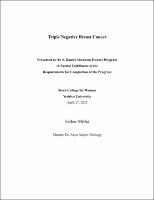Please use this identifier to cite or link to this item:
https://hdl.handle.net/20.500.12202/9010| Title: | Triple negative breast cancer |
| Authors: | Alayev, Anya Miller, Esther |
| Keywords: | breast cancer Triple negative breast cancer (TNBC) ER-negative breast cancer MDA-MB-231 cells chemotherapy Tamoxifen |
| Issue Date: | 27-Apr-2023 |
| Publisher: | Yeshiva University |
| Citation: | Miller, E. (2023, April 27). Triple negative breast cancer [Unpublished undergraduate honors thesis]. Yeshiva University. |
| Series/Report no.: | S. Daniel Abraham Honors Program;April 27, 2023 |
| Abstract: | Cancer is the second leading cause of death worldwide and has an impact on everyone. Approximately every two minutes, a woman in the United States is diagnosed with breast cancer and recently there has been an increase in the incidences of breast cancer. Breast cancer is the leading cause of cancer related deaths in women worldwide with a fatality rate of about 2.6%. Triple negative breast cancer (TNBC), a subtype of breast cancer, makes up approximately 10- 15% of all breast cancers. It is a subset of ER-negative breast cancer and does not have estrogen receptor alpha, progesterone receptor, and HER2 markers. It is usually a more aggressive form of breast cancer, has more metastasis, and the recurrence free survival is short. As of now, there only exists targeted therapies to treat ER-positive breast cancer. For TNBC, the identifying factors, the markers, that aid in treatment success are lacking and therefore no previous targeted therapies are effective. The only option that exists is chemotherapy, however it is usually not effective and comes with many adverse side effects. There exists a great need to continue exploring treatment options for TNBC and in order to do so, the pathways and mechanisms that are unique to it must be explored. It has been shown that ERRα provides the metabolic needs and energy of the rapidly dividing tumor cells and a high level of ERRα expression has been linked to worse outcomes for breast cancer patients. Additionally, the mitogen-activated protein kinase (MAPK) pathway is involved in cell proliferation and in cancer cells the receptors responsible for activating this pathway are overexpressed. The PI3K-Akt pathway is also involved in cell proliferation and a mutation in the Akt protein, or an upregulation of it, is associated with the formation of tumors. ¶ MDA-MB-231 cells were studied to see how tamoxifen, XCT-790, and U0126 effected its cell proliferation. Tamoxifen is a selective estrogen receptor modulator, meaning an antagonist for ERs in breast tissue, XCT-790 is a specific antagonist of ERRα, and U0126 is an inhibitor of MEK/ERK or the MAPK pathway. It was discovered that the inhibition of MAPK signaling, U0126, and the use of an antagonist of ERRα, XCT-790, lead to a significant decrease in cell proliferation in the TNBC cells. For the first time, there has been seen that a link exists between ERRα expression and the MAPK signaling pathway. This lays down the foundation for a possible therapeutic use of the MAPK inhibitors in treating TNBC that expresses ERRα. |
| Description: | Undergraduate honors thesis / Open Access |
| URI: | https://hdl.handle.net/20.500.12202/9010 |
| Appears in Collections: | S. Daniel Abraham Honors Student Theses |
Files in This Item:
| File | Description | Size | Format | |
|---|---|---|---|---|
| Esther Miller Thesis Open Access 2023.pdf | 1.78 MB | Adobe PDF |  View/Open |
This item is licensed under a Creative Commons License

